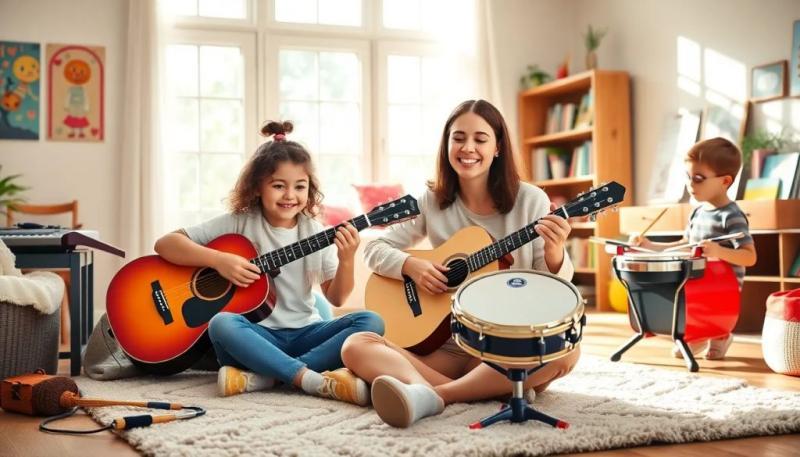Finding the best babysitters for music lessons can be crucial for parents looking to enhance their children's musical education. With the right caregiver, children can thrive in both their learning and artistic expression. This guide will help you navigate the options available to ensure that your child receives quality music instruction while being cared for.In a world filled with various childcare options, it’s essential to explore the right fit for your needs. By understanding what to look for in babysitters who offer music lessons, you can make informed decisions that benefit your family.
What Are The Best Babysitters For Music Lessons?
When searching for the best babysitters for music lessons, consider individuals who not only provide childcare but also have a strong background in music education. These caregivers are typically experienced in teaching children various instruments or vocal techniques. Many babysitters are skilled musicians themselves, often offering classes in instruments like guitar, piano, or voice. Parents should look for profiles that highlight specific musical skills, as well as past teaching experiences. Moreover, a reliable babysitter will have a solid background in childcare and may possess certifications in First Aid or CPR. This adds an extra layer of safety and trust when leaving your child in their care. Finally, exploring local platforms, such as Care.com, can help you find affordable babysitters for music lessons in my area, allowing for convenient and personalized music education.How To Find A Babysitter Who Offers Music Lessons?
Finding a babysitter who offers music lessons can be straightforward if you know where to look. Start by utilizing online childcare platforms that specialize in connecting parents with suitable caregivers. Websites like Care.com allow you to filter your search based on specific skills, including music education.Consider joining local parenting groups or forums where recommendations for reliable babysitters may be shared. These communities often have firsthand experiences and can point you toward local babysitters offering music classes who are well-reviewed.Another effective method is to ask within your circle of friends or family. Personal recommendations can lead you to trustworthy caregivers who have a proven track record with music education. Finally, don’t hesitate to conduct interviews or trial sessions. This not only helps you gauge the babysitter's teaching style but also allows your child to feel comfortable with their new instructor.Where Can I Find Trusted Babysitters For Kids’ Music Lessons?
To locate trusted babysitters for kids’ music lessons, start by exploring established platforms such as Care.com. This website offers profiles of background-checked caregivers, providing peace of mind when selecting someone to care for your child.In addition to online searches, check with local music schools or community centers. They may have recommendations or even partnerships with babysitters who specialize in music education. Another option is to visit local bulletin boards in libraries, schools, or cafes, where babysitters often post flyers advertising their services. Here, you can find contact information for reliable babysitters with music skills nearby.Don’t forget to check the qualifications of potential babysitters thoroughly. Look for certifications that indicate their expertise in both childcare and music, ensuring that your child receives quality education.What Qualifications Should A Babysitter Have For Music Lessons?
When selecting a babysitter for music lessons, specific qualifications can make a significant difference. Look for caregivers who hold relevant degrees or certifications in music education, as this indicates a level of professionalism and knowledge.Experience is another crucial factor. A babysitter who has previously taught music lessons or has a background in performing arts can provide a richer learning experience. You may also want to consider their background in childcare, particularly if they have experience with children of similar ages to yours.It's beneficial if the babysitter has additional certifications, such as CPR or First Aid. This not only ensures your child's safety but also indicates a responsible and prepared caregiver. Lastly, personal attributes, such as patience, creativity, and a passion for music, are essential in a babysitter. These traits can foster a nurturing environment that encourages your child’s musical growth.How Much Do Babysitters Charge For Music Lessons?
The cost of babysitters who provide music lessons can vary widely based on several factors. Typically, rates depend on the babysitter's level of experience, qualifications, and the complexity of the music instruction provided. On average, you might expect to pay between $15 to $50 per hour for music lessons combined with babysitting services. More experienced babysitters or those with specialized music education backgrounds may charge higher rates. In some cases, families might find that negotiating a flat rate for multiple hours of care and lessons can be more economical. This approach can help balance the costs associated with both babysitting and music education.It's advisable to discuss payment structures upfront and ensure transparency regarding any additional fees associated with music materials or travel.What Are The Benefits Of Babysitters Providing Music Lessons?
Hiring babysitters who provide music lessons comes with numerous benefits. Not only do they care for your child, but they also enrich their educational experience. This dual role fosters a love for music while ensuring your child is engaged and entertained.One significant advantage is the individualized attention your child receives. A babysitter who focuses on music education can tailor lessons to suit your child's learning pace and interests, leading to a more effective learning experience. Moreover, music education has been linked to cognitive development. Children who engage in music lessons often exhibit improved language skills, enhanced creativity, and better problem-solving abilities. Lastly, having a caregiver who understands both childcare and music can provide a seamless routine for your child. This continuity can help your child feel more secure and confident in both their learning and personal growth.Related questions about finding the best babysitters for music lessons
How much do music teachers charge per hour?
The hourly rates for music teachers vary widely based on experience and location. Generally, music teachers can charge anywhere from $20 to $100 per hour, depending on their expertise and the specific instrument being taught. More experienced teachers or those with advanced degrees may command higher rates. Additionally, teachers offering lessons online might have different pricing structures compared to in-person lessons. Many factors influence these rates, including local demand and competition.What is the best age for kids to start music lessons?
The best age for kids to start music lessons can differ depending on the child and the instrument. Many experts suggest that children can begin informal music exposure as early as age 3 through listening and basic rhythm exercises. However, structured music lessons typically begin around ages 5 to 7 when a child can focus for longer periods and understand basic musical concepts. Factors such as interest, maturity, and readiness should also be considered when deciding on the right time.Is music class good for babies?
Yes, music classes can be beneficial for babies. Exposure to music at a young age can aid in their cognitive development, promote language acquisition, and enhance emotional expression. Music classes for infants often focus on sensory experiences, allowing them to explore sounds, rhythms, and movement. This early engagement lays the foundation for a lifelong appreciation for music and can be a delightful bonding experience between parent and child.Should I make my child take music lessons?
Encouraging your child to take music lessons can offer numerous advantages. Music education promotes discipline, enhances cognitive skills, and boosts self-esteem. However, it’s crucial to gauge your child's interest and readiness. If they show enthusiasm for music, lessons can provide a structured way for them to develop their talents. Ultimately, the decision should consider your child's preferences and passion for music.En este contexto, te presentamos un video que explora las mejores niñeras especializadas en lecciones de música, ayudándote a encontrar la opción ideal para tu pequeño músico.




